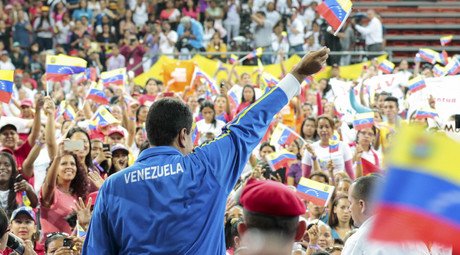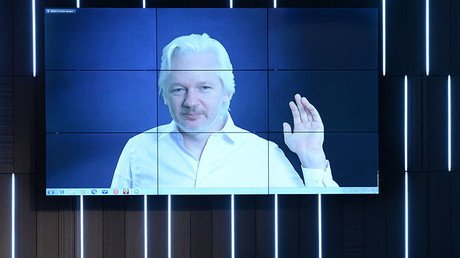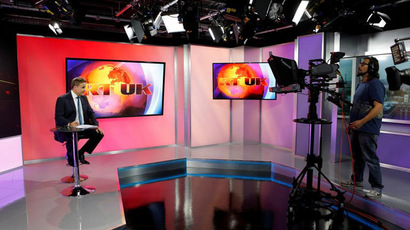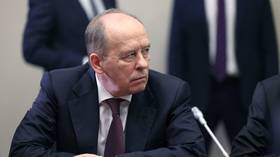New era of journalism: People against the gatekeepers
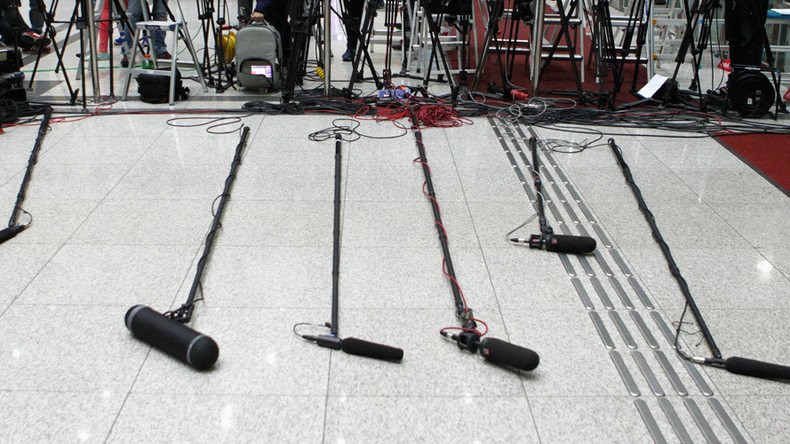
What does the post-mainstream era hold for journalism? Can censorship exist in an era of total access to information? Where does freedom of expression begin and where does it end?
These were just three of the important questions addressed at the "New Era of Journalism" conference held in Moscow this week, an event which brought together leading journalists from 32 countries and also featured a video link up with Wikileaks founder and editor-in-chief Julian Assange from the Ecuadorian Embassy in London.
Opening the proceedings, Dmitry Kiselev, Director General of the Rossiya Segodnya news organization, said that since 2001 the US had interfered with and destroyed a number of countries around the world with wars and interventions based on lies. These lies, such as the blatantly false claim that Iraq had WMDs which could be launched within 45 minutes, were promoted by US State Department/NATO-friendly news channels and other media as proven facts which they clearly were not.
Actually, the US policy predates the terrorist attacks on New York, as citizens of the former Federal Republic of Yugoslavia, who were bombed by NATO for 78 days and nights in 1999, would testify. The most drastic form of censorship was imposed in that conflict too, when Serbian state television (RTS), was bombed and 16 employees killed. But it was the "humanitarian crusaders" of a US-led military alliance doing the killing, so there were no ‘Ja sam Jelica’ or 'Ja sam Branislav’ marches of solidarity in western capitals. It seems it’s ok to kill media workers if it’s "our side" that does it. Then the victims are "unpeople".
Frank La Rue, the Assistant Director-General of UNESCO for Communication and Information, said that the role of the journalist will always be the same but that new technology had been a major game changer. He talked of how technology has enabled the common citizen to participate, describing the "democratization of community". Of course, for elite gatekeepers the fact that the "common citizen" can now answer back on forums such as Twitter and challenge Establishment-friendly commentators is not a welcome development. Hence the growing calls for greater censorship of social media.
Speaking from London, Julian Assange said that freedom of expression on Twitter was under threat from both the right on grounds of "anti-terrorism/ anti-extremism" and the "identity politics left" who are attempting to censor views they deem to be offensive. He said he was not as optimistic as others who had spoken at the conference on how new forms of media can help defeat censorship, noting how Internet giant Google was "heavily integrated" with Washington power "at personal level and at business level. As an example he told delegates how the company used its front page to "promote John Kerry's call for bombing on Syria in 2013" and said that Google was "directly engaged" in Hillary Clinton’s US Presidential campaign.
The media censors the news by simply not reporting it, Assange said. He cited the Nobel Prize acceptance speech given by British playwright Harold Pinter in 2005.
Pinter asked why US wars of aggression in Iraq and elsewhere in history had very little documentation or coverage in the west and were not on anyone’s mind but the atrocities and abuses of Stalinist Russia were easy to recall and known in quite some detail. He said these words in relations to those US wars: "It never happened. Nothing ever happened. Even while it was happening it wasn't happening. It didn't matter. It was of no interest. The crimes of the United States have been systematic, constant, vicious, remorseless, but very few people have actually talked about them."
"Now those are strong words," said Assange, "but I think they have largely been correct for what the establishment western media has done with the reporting of war. And it’s something which has undoubtedly contributed to the elongation of wars and contributed directly to their commencement. A case in point was of course Iraq where the war was started through mass lies spread through the media."
Assange noted that the playwright’s speech was not reported by Britain’s state broadcaster, the BBC, despite the fact that a British playwright had won a Nobel Prize.
It seems that like the US wars it discussed, the speech never happened. Even when it was happening, it wasn’t happening. It didn’t matter. It was of no interest.
Assange also drew attention to the way the UK establishment reacted in February to the UN panel ruling that he had been illegally and "arbitrarily detained". He showed conference a tweet by UK Minister of State Hugo Swire mocking the ruling. Swire posted a picture of himself pretending to strangle his dog and wrote: "Oh dear, Rocco appears to be #arbitarilydetained "
UK Minister of State mocks UN ban on arbitrary detention by strangling his dog (in response to #Assange win at UN) https://t.co/OEo4l35Y1Q
— WikiLeaks (@wikileaks) February 7, 2016
"Can you imagine if Lavrov (the Russian Foreign Minister) had tweeted a picture of him with his dog with the same message after Pussy Riot were arrested?" asked Assange. NATO-friendly "free speech" crusaders would have churned out "outraged" OpEd pieces. But it was a British Minister ridiculing Assange’s arbitrary detention, so, to use Harold Pinter’s phrase, it never happened.
British/Irish journalist Liam Halligan, a columnist for the Sunday Telegraph newspaper, told the conference how economic factors are making journalism less socially representative in the UK. Once journalism had been a route to social mobility for talented working-class people. But cutbacks in news organizations have meant that those from wealthier backgrounds now benefit the most as they can afford to take unpaid internships. Journalists from such backgrounds are less likely to shine a torch on what the 1 percent and establishment elites get up to.
Eva Golinger, author and presenter for RT Spanish, talked of the pernicious role played by Venezuelan corporate media in the anti-democratic coup (which was later reversed) against Hugo Chavez in 2002. US Ambassador Shapiro actually went to a privately owned television studio to discuss how news reports should be edited. She told the conference how US "democracy promoting" agencies like USAID and NED had spent millions of dollars in trying to achieve "regime change" in Venezuela and on the role of the media in the recent coup in Brazil.
Many delegates touched on the new information ‘Cold War’ which had developed in the last few years. As in the old ‘Cold War’, McCarthyism has reared its ugly head again in the west with journalists who oppose NATO‘s aggressive policies towards Russia subject to relentless attacks and smear campaigns which are designed to destroy the journalist’s career.
I told the conference how the parameters of "acceptable" debate on foreign policy had become narrower in recent years, citing as an example the career of the award winning anti-war journalist John Pilger.
From the 1960s to the first decade of the 21st century Pilger’s outstanding, thought-provoking work could be found in western mainstream publications and his documentaries could be watched on western mainstream television networks. Pilger had a regular column in the Daily Mirror newspaper and the New Statesman magazine. His films were shown on ITV. But in recent years, Pilger has become an outcast as far as western mainstream media is concerned. In 2016, you’ve got to tune into Russian media to hear this legendary journalist’s views. In fact, if you want to find any really outspoken criticism of NATO, the west’s disastrous foreign policy and its double standards, you have to watch channels like RT.
You won’t see Pilger and people with Pilger’s views on foreign policy on Newsnight or on prime-time ITV. "Democratic" gatekeepers and Imperial Truth Enforcers have seen to that.
Since 2003, the people who called Iraq right have been blackballed while those who helped spread war propaganda are still in position or in some cases have even been promoted.
This New McCarthyism may serve elite interests, but in terms of ratings its been disastrous. The success and growing popularity of channels like RT which urge us to "Question More", is directly attributable to the narrowing of the parameters of debate on western news channels. Who wants to watch a "debate" on Syria between a hard-right neocon and a Blairite "liberal interventionist" both of whom are desperate for "regime change"? Why are the voices of those who actually support the Syrian government (possibly a majority of Syrians) or who oppose all meddling in the affairs of sovereign states never heard?
I call RT the zeitgeist channel because it responds to the desire of viewers who are sick and tired of the same old Establishment voices preaching to us and want to hear a much wider range of opinions, including those who support governments and leaders demonized by Washington and London-based neocons. The attacks that RT has been subject to by the west's endless war lobby, who would dearly love to have the station taken off air, clearly shows what an impact it has made. Last December RT on You Tube exceeded 3 billion views - way ahead of its rivals.
"We want a colorful multi-polar world and a media landscape that reflects that", Dimitry Kiselev told the conference. Only Cyril Waugh-Monger type McCarthyites, desperate to regain control of the narrative and destroy media pluralism, could possibly disagree with that sentiment.
Modern technology certainly provides us with great opportunities to build a more democratic media landscape. As Alexei Volin, Russia’s Deputy Minister of Communications and Mass Media highlighted, you only need around $5000 to set up your own television studios these days. But the threat of censorship and attacks on those who simply want to get the truth out to the public remains, as the plight of Julian Assange, holed up in the Ecuadorian Embassy for almost four years now, illustrates.
On arriving home from the conference, I was greeted with the shocking news that Argentina’s new right-wing US State Department friendly government had suspended RT Spanish and Venezuela’s TeleSUR from free-view transmission.
Will this brazen act of political censorship, described by one Argentinian commentator as an "all-out psychological onslaught on all of Latin America", be fiercely attacked by western anti-censorship groups who claim to support media pluralism? I fear that Harold Pinter’s "It Never Happened even while it was happening" theory will once again prove to be correct.
Follow Neil Clark on Twitter@NeilClark66
The statements, views and opinions expressed in this column are solely those of the author and do not necessarily represent those of RT.

